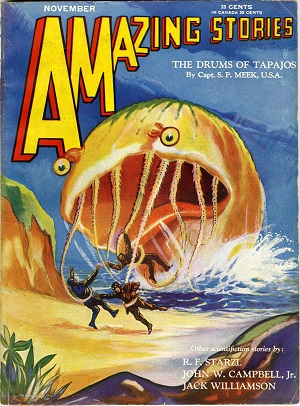
In 1930, safe from the predations of Hugo “the Rat” Gernsback, future Appendix N author Jack Williamson returned to Amazing Stories, closing out the year with “The Cosmic Express.” In that far future, a pulp writer and his wife, Eric and Nada, are caught up in the nostalgia for more primitive times. Eric writes hit savage stories that are a cross between Tarzan and the barbarians Hok/Hauk/Hoak, while Nada is a poet of a nature long extinct. Bored of an Earth that has turned into one city, they decide to use the recent invention of the Cosmic Express to travel to the pristine and savage jungles of Venus. After some bribery, they come face to face with the realities of the uncivilized life, including predatory beasts.
Like many short pulp stories, “The Cosmic Express” is built around its punchline, where the characters of Eric’s stories act with the heroism and competence that he did not display on Venus. It’s a standard punchline story, with the vivid descriptions expected of pulp adventure. To modern readers, this is a divisive story, with many of the usual suspects at Goodreads complaining about the naivety of Eric and Nada. Which, honestly, is the point of the story. For while “The Cosmic Express” serves to instill some proper respect for the peril inherent in nature, it is also a commentary in conversation with other science fiction and fantasy stories.
Talk of cosmic rays, Venusian forests, and man surviving in the wilds of nature suggested the planetary romances of Edgar Rice Burroughs, as well as Tarzan. And the direct challenge to the love of the barbarian certainly brings to mind Robert E. Howard. But where both Burroughs and Howard used the barbarian to explore the savagery of those who call themselves civilized, Williamson instead contrasts the softness of the writer to the characters they create. Here he shows the weakness of the civilized compared to the natural state they glorify. “The Cosmic Express” can be read as a challenge to the resulting glorification of the noble savage in science fiction and an extolling of the material comforts brought by civilization.
The novelty of the Cosmic Express as a method of transportation might be lost to modern readers as well, since the method of travel is reminiscent of Star Trek’s transporters. In fact, Eric and Nada’s adventure reads like an Away Team gone wrong, although one lacking redshirts. The ensuing rescue by Express Beam gives their ordeal the same impact as a miserable weak at camp, and just as easily forgotten, as Eric’s following story shows.
All in all, “The Cosmic Express” is an evocative but safe early short story by Williamson that helps establishes the Great Conversation between science fiction works so beloved by pulp and Campbelline writers. It helped to distance the Amazing Stories-brand of science fiction from the mainstream planetary and primitive romance adventures that served as the mainstream of science fiction, as well as establish Williamson as an author to follow. But the full promise of the fledgling genre and writer would need more time to develop.
Not Jack’s finest tale, but he certainly improved! One of the greats. I’ll take him over Asimov any day.
Did I mention that he was a huge Merritt fan?
“with many of the usual suspects at Goodreads complaining about the naivety of Eric and Nada.”
I’ll read just for this. If those pretentious snobs from Goodreads didn’t like it, then there must be something good in this story.